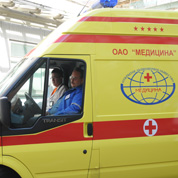Medicina becomes the first Russian clinic to receive JCI’s elite accreditation

Stringent accreditation procedures
Speaking at the press conference, Carlo Ramponi, the managing director of JCI’s European Bureau, specially noted that in 75 years of JCI’s existence only 440 of the best medical facilities in different countries around the world have been able to successfully pass the commission’s rigid accreditation procedures. He attributed the relatively small number to the fact that the JCI’s accreditation criteria for medical facilities are very high, and consequently, not every hospital or clinic wishing to get the accreditation can successfully pass the process.
For instance, there are over 300 various rules and requirements, from the time of patient’s admission up to the time of discharge, that have to be satisfied and built around client’s needs and expectations. "As a rule, healthcare facilities seeking JCI’s accreditation have to go through a long process of preparation and not all of them are usually destined to successfully complete this journey to the end. This is because JCI strictly monitors the compliance of aspiring clinics to the established criteria so as to protect its reputation and brand name.”
Speaking specifically about Medicina’s accreditation success, the head of the JCI‘s European Bureau recalled his overt skepticism about a year ago, when he was approached by the clinic’s president, Grigory Roytberg, to enquire about how to get the commission’s accreditation. "Then, my skepticism stemmed from two key factors. First of all, our commission has never worked with clinics in Eastern Europe, and secondly, I was personally not very familiar with Russia’s official healthcare system in general and the situation in the Medicina Clinic in particular."

Ramponi noted that when he first arrived in Moscow last year on a familiarization tour of the clinic, he was ‘pleasantly surprised’ by what he saw on that visit, as well as the further active and constructive work undertaken by the clinic’s management to achieve its stated goal. "Today I’m highly impressed by the fact that it took Medicina, a Russian clinic, less than a year of preparations to get the JCI’s accreditation. I must note that it is a rare case in our practice for a clinic to be able to successfully complete accreditation procedures within just a year. I attribute this success to Medicina’s long track record of qualified medical care and its constant improvement of the overall quality of its healthcare services,” he added. “This successful example of Medicina shows that private clinics can fully demonstrate their compliance to the best international standards in treatment of patients."
Medicina’s high standards make the JCI’s accreditation process easy
In his speech, the president of the Medicina clinic — a professor of medicine, corresponding member of the Russian Academy of Medical Sciences, Honored Physician of the Russian Federation, a laureate of the Russian government’s Prize in Education, and head of Therapy and Family Medicine Department at the Russian State Medical University — said he saw nothing strange or unusual in JCI’s recognition of the clinic’s high standard of medical services, as other equally reputable organizations have already confirmed the clinic’s strict conformation to the highest standards of modern healthcare. "For example, our clinic has been certified by the International Organization for Standardization (ISO 9001:2000); it is a member of The Leading Swiss Hospitals Association, as well as laureates of various Russian and international awards in healthcare industry,” he noted.
One of the key factors that played role in improvement of clinic’s work and prepared it for JCI accreditation was detailed analysis of previous client’s suggestions and complaints. Implemented in 2010, this approach helped to create better atmosphere and provide better services for patients. “The JCI accreditation is the result of years of systematic work in providing quality healthcare services. The commission’s priority criterion for the recognition of clinic’s standard is the principle of maximum transparency and full involvement of patients in the entire treatment management process,” he added. “Our patients have electronic access to their medical histories, and we respect patients’ right to the so-called ‘second opinion’ by other medical experts and strive to involve our patients in their treatment procedures.”
The official speeches were later followed by the Q&A session, a traditional procedure in all press conferences, as the chief speakers and other experts in medicine fielded questions from the members of the press, which covered all the aspects of the procedure for obtaining the JCI accreditation, the benefits that it brings to its holders and, more importantly, how all these new developments will now eventually affect the final costs of treatment for patients in the clinic. Answering the last question, Medicina president specifically noted that nothing in terms of pricing policy will change for the patients, except that they will now be getting a much higher level of qualified medical care services that are now available in the clinic, thanks to its successful accreditation by JCI.
level of qualified medical care services that are now available in the clinic, thanks to its successful accreditation by JCI.
The press conference was accompanied by an excursion tour of the clinic, during which mass media representatives and other organizations associated with the healthcare system were shown the clinic’s in-patient ward as well as clinical, dentistry, pediatrics, urology, family medicine departments, etc., where departments’ heads and/or various high-ranking specialists gave detailed accounts of their facilities, as they displayed, with overt pride, some of the latest medical technology equipment and gadgets at their disposals.
One of the tour’s major highlights, in TRCW correspondents’ opinion, was the so-called "smart ward" fully equipped with various IT gadgets that allow patients to regulate everything in sight via a remote control or by pressing appropriate buttons on a movable computer interface. Other benefits of this ‘wonder ward’ include provision for patients to an online access to their medical histories, making appointments with doctors and even making Skype calls via an electronic information kiosk.
.












 Web design,
Web design,